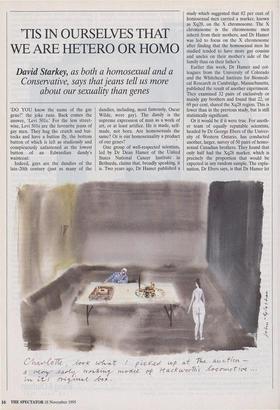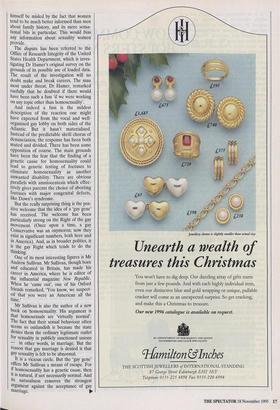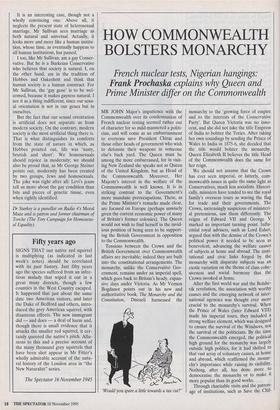'TIS IN OURSELVES THAT WE ARE HEIERO OR HOMO
David Starkey, as both a homosexual and a
Conservative, says that jeans tell us more about our sexuality than genes
`DO YOU know the name of the gay gene?' the joke runs. Back comes the answer, 'Levi 501s.' For the less street- wise, Levi 501s are the favourite jeans of gay men. They hug the crutch and but- tocks and have a button fly, the bottom button of which is left as studiously and conspicuously unfastened as the lowest button of an Edwardian dandy's waistcoat.
Indeed, gays are the dandies of the late-20th century (just as many of the dandies, including, most famously, Oscar Wilde, were gay). The dandy is the supreme expression of man as a work of art, or at least artifice. He is made, self- made, not born. Are homosexuals the same? Or is our homosexuality a product of our genes?
One group of well-respected scientists, led by Dr Dean Hamer of the United States National Cancer Institute in Bethseda, claims that, broadly speaking, it is. Two years ago, Dr Hamer published a study which suggested that 82 per cent of homosexual men carried a marker, known as Xq28, on the X chromosome. The X chromosome is the chromosome men inherit from their mothers, and Dr Hamer was led to focus on the X chromosome after finding that the homosexual men he studied tended to have more gay cousins and uncles on their mother's side of the family than on their father's.
Earlier this week, Dr Hamer and col- leagues from the University of Colorado and the Whitehead Institute for Biomedi- cal Research in Cambridge, Massachusetts, published the result of another experiment. They examined 32 pairs of exclusively or mainly gay brothers and found that 22, or 69 per cent, shared the Xq28 region. This is fewer than in the previous study, but is still statistically significant.
Or it would be if it were true. For anoth- er team of equally reputable scientists, headed by Dr George Ebers of the Univer- sity of Western Ontario, has conducted another, larger, survey of 50 pairs of homo- sexual Canadian brothers. They found that only half had the Xq28 marker, which is precisely the proportion that would be expected in any random sample. The expla- nation, Dr Ebers says, is that Dr Hamer let himself be misled by the fact that women tend to be much better informed than men about family history, and its more sensa- tional bits in particular. This would bias any information about sexuality women provide.
The dispute has been referred to the Office of Research Integrity of the United States Health Department, which is inves- tigating Dr Harrier's original survey on the grounds of its possible use of loaded data. The result of the investigation will no doubt make and break careers. The man most under threat, Dr Hamer, remarked ruefully that he doubted if there would have been such a fuss 'if we were working on any topic other than homosexuality'.
And indeed a fuss is the mildest description of the reaction one might have expected from the vocal and well- organised gay lobby on both sides of the Atlantic. But it hasn't materialised. Instead of the predictable shrill chorus of denunciation, the response has been both muted and divided. There has been some Opposition of course. The main grounds have been the fear that the finding of a genetic cause for homosexuality could lead to genetic testing of foetuses to eliminate homosexuality as another unwanted disability. There are obvious parallels with amniocentesis which effec- tively gives parents the choice of aborting foetuses with major congenital defects, like Down's syndrome.
But the really surprising thing is the pos- itive welcome that the idea of a `gay gene' has received. The welcome has been particularly strong on the Right of the gay movement. (Once upon a time, a gay Conservative was an oxymoron; now they exist in significant numbers, both here and in America). And, as in broader politics, it is the gay Right which tends to do the thinking. One of its most interesting figures is Mr Andrew Sullivan. Mr Sullivan, though born and educated in Britain, has made his career in America, where he is editor of the influential magazine New Republic. When he 'came out', one of his Oxford friends remarked, 'You know, we suspect- ed that you were an American all the time.'
Mr Sullivan is also the author of a new book on homosexuality. His argument is that homosexuals are 'virtually normal'. The fact that their sexual behaviour often seems so outlandish is because the state denies them the ordinary legitimate outlet for sexuality in publicly sanctioned unions in other words, in marriage. But the reason that gay marriage is denied is that gay sexuality is felt to be abnormal. It is a vicious circle. But the 'gay gene' offers Mr Sullivan a means of escape. For if homosexuality has a genetic cause, then it is natural, if not necessarily normal. And its naturalness removes the strongest argument against the acceptance of gay marriage. It is an interesting case, though not a wholly convincing one. Above all, it neglects the present state of heterosexual marriage. Mr Sullivan sees marriage as both natural and universal. Actually, it looks more and more like a human institu- tion, whose time, as eventually happens to all human institutions, has passed.
I too, like Mr Sullivan, am a gay Conser- vative. But he is a Burkeian Conservative who believes that society is natural. I, on the other hand, am in the tradition of Hobbes and Oakeshott and think that human society is a human construct. For Mr Sullivan, the 'gay gene' is to be wel- comed, because it makes gayness natural. I see it as a thing indifferent, since our sexu- al orientation is not in our genes but in ourselves.
But the fact that our sexual orientation is artificial does not separate us from modern society. On the contrary, modern society is the most artificial thing there is. That is what distinguishes its comforts from the state of nature in which, as Hobbes pointed out, life was 'nasty, brutish and short'. We homosexuals should rejoice in modernity; we should also be proud that, as Mr George Steiner points out, modernity has been created by two groups, Jews and homosexuals. The joke was right after all: Levi's jeans tell us more about the gay condition than bits and pieces of genetic tissue, even when rightly identified.
Dr Starkey is a panellist on Radio 4's Moral Maze and is patron and former chairman of Torche (The Tory Campaign for Homosexu- al Equality),




















































































 Previous page
Previous page